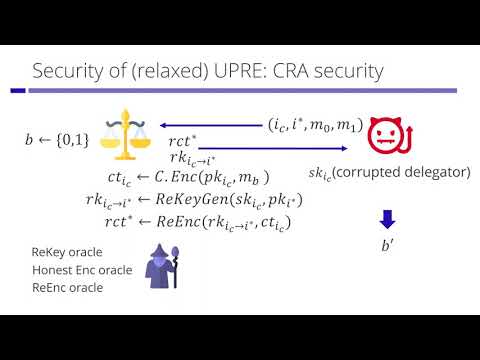CryptoDB
Universal Proxy Re-Encryption
| Authors: | |
|---|---|
| Download: | |
| Abstract: | We put forward the notion of universal proxy re-encryption (UPRE). A UPRE scheme enables a proxy to convert a ciphertext under a (delegator) public key of any existing public-key encryption (PKE) scheme into another ciphertext under a (delegatee) public key of any existing PKE scheme (possibly different from the delegator one). The proxy has a re-encryption key generated from the delegator's secret key and the delegatee public key. Thus UPRE generalizes proxy re-encryption by supporting arbitrary PKE schemes and allowing to convert ciphertexts into ones of possibly different PKE schemes. In this work, we - provide syntax and definitions for both UPRE and a variant we call relaxed UPRE. The relaxed variant means that decryption algorithms for re-encrypted ciphertexts are slightly modified but still only use the original delegatee secret keys for decryption. - construct a UPRE based on probabilistic indistinguishability obfuscation (PIO). It allows us to re-encrypt ciphertexts polynomially many times. - construct relaxed UPRE from garbled circuits (GCs). We provide two variants of this construction, one which allows us to re-encrypt ciphertexts polynomially many times, and a second one which satisfies a stronger security requirement but only allows us to re-encrypt ciphertexts a constant number of times. |
Video from PKC 2021
BibTeX
@article{pkc-2021-30981,
title={Universal Proxy Re-Encryption},
booktitle={Public-Key Cryptography - PKC 2021},
publisher={Springer},
doi={10.1007/978-3-030-75245-3_19},
author={Nico Döttling and Ryo Nishimaki},
year=2021
}

